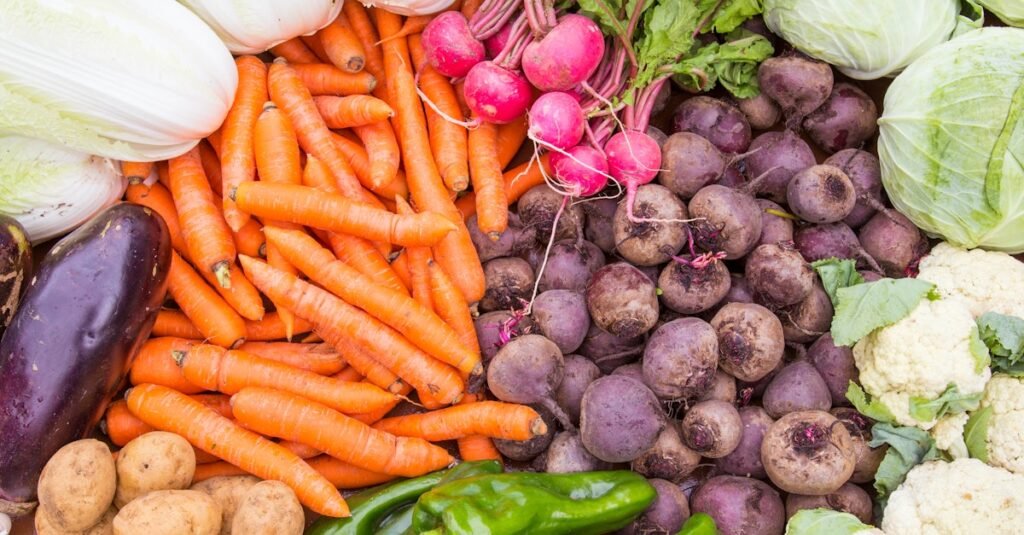A diet rich in vegetables is an excellent way to increase your fiber intake and improve your overall health. Fiber is essential for gut health, heart health, and metabolic health. There are two main types of fiber: soluble and insoluble. Soluble fiber helps you feel full, controls blood sugar and cholesterol levels, while insoluble fiber promotes healthy digestion and regular bowel movements.
Additionally, fiber acts as food for the beneficial bacteria in your gut, supporting a healthy gut microbiome. By consuming a variety of fiber-rich foods, you can promote the growth of these “good” bacteria, which are associated with better health.
Here are 12 high-fiber vegetables that you can incorporate into your diet:
1. Carrots: 3.08g fiber per 1 cup
Carrots are rich in soluble fiber and provide important plant compounds like carotenoids and lutein, which have numerous health benefits.
2. Broccoli: 5.14g fiber per 1 cup
Broccoli is a cruciferous vegetable that is high in soluble fiber and contains sulforaphane, a plant compound that may lower the risk of chronic diseases.
3. Beetroot: 2g fiber per two beets
Beets are a good source of both soluble and insoluble fiber, as well as nitrates that can help lower blood pressure.
4. Cauliflower: 2.86g fiber per 1 cup
Cauliflower is a low-carb vegetable that is rich in insoluble fiber, which can aid digestion and promote regular bowel movements.
5. Bitter gourd: 2.48g fiber per 1 cup
Bitter gourd is low in calories and provides soluble fiber, making it beneficial for blood sugar control and antioxidant protection.
6. Eggplant: 2.48g fiber per 1 cup
Eggplant contains both soluble and insoluble fiber, with the skin being a rich source of antioxidants called anthocyanins.
7. Collard greens: 7.6g fiber per 1 cup
Collard greens offer a high amount of soluble fiber and can be prepared in various ways to add fiber to your meals.
8. Swiss chard: 3.68g fiber per 1 cup
Swiss chard is a versatile vegetable that provides soluble fiber and can be easily added to salads, soups, and stir-fries.
9. Artichokes: 9.58g fiber per 1 cup
Artichokes are rich in insoluble fiber and antioxidants that support liver health.
10. Potatoes: 3.63g fiber per medium potato with skin
Potatoes contain both soluble and insoluble fiber, especially when consumed with the skin on.
11. Brussels sprouts: 4.06g fiber per cup
Brussels sprouts offer a balanced mix of soluble and insoluble fiber and can be included in various dishes.
12. Legumes
Legumes are excellent sources of soluble fiber and can be added to salads, casseroles, and curries for a fiber boost.
Incorporating these high-fiber vegetables into your diet can have numerous benefits, including improved gut health, regular bowel movements, lower cholesterol levels, better blood sugar control, and reduced risk of certain cancers. It’s important to increase your fiber intake gradually to avoid digestive issues and stay hydrated to support digestion.
Fiber plays a crucial role in supporting a healthy gut microbiome, as it nourishes beneficial bacteria in the gut. While fiber supplements are available, it’s best to get your fiber from whole foods to maximize the benefits. Research on the effects of fiber on the gut microbiome is ongoing, and personalized nutrition programs like ZOE can provide tailored advice based on your individual gut health.
Overall, a high-fiber diet is essential for overall health and well-being. By incorporating a variety of fiber-rich vegetables into your meals, you can support your gut health, improve digestion, and reduce the risk of chronic diseases. Take our free quiz to learn more about how ZOE can help you achieve your health goals through personalized nutrition recommendations.


